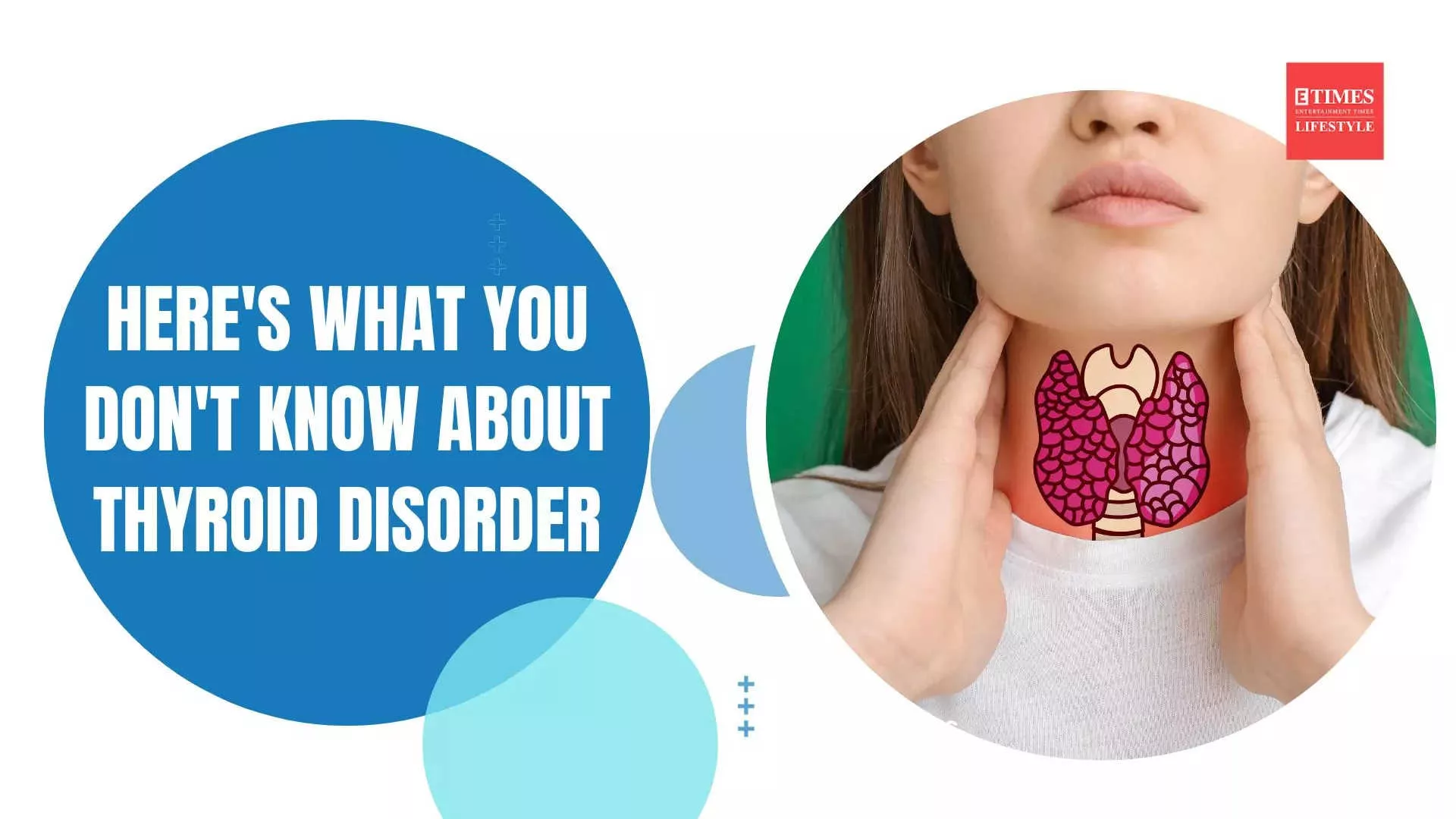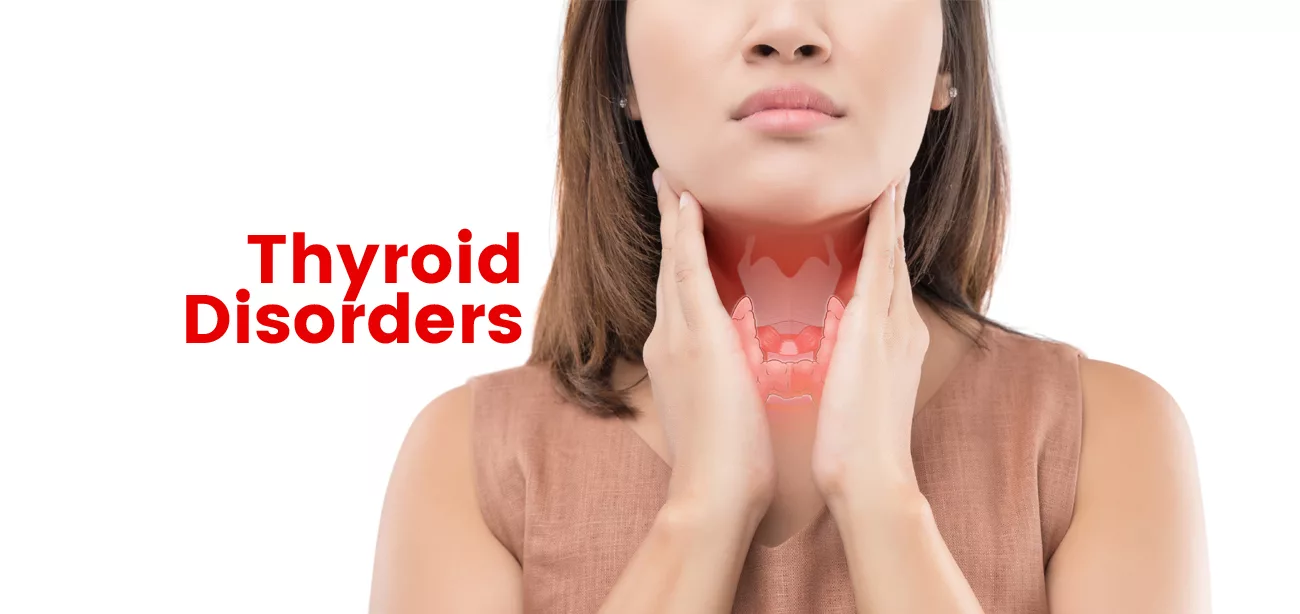Demystifying Thyroid Disorders: A Comprehensive Guide
The thyroid gland, a small butterfly-shaped organ located in the neck, plays a crucial role in regulating various bodily functions. This gland produces hormones that control metabolism, energy production, and overall well-being. However, when something goes awry with the thyroid gland, it can lead to a range of health issues known as thyroid disorders. Thyroid disorders are prevalent, affecting millions of people worldwide. While they can vary in severity and presentation, they all stem from disruptions in thyroid hormone production. In this blog post, we’ll explore the different types of thyroid disorders, their causes, symptoms, diagnosis, and treatment options.
Anatomy and Function of the Thyroid Gland

Before delving into thyroid disorders, it’s essential to understand the anatomy and function of the thyroid gland. The thyroid gland is located in the front of the neck, just below the Adam’s apple. It consists of two lobes on either side of the trachea, connected by a narrow band of tissue called the isthmus.
The primary function of the thyroid gland is to produce hormones that regulate metabolism and maintain the body’s overall energy balance. The two key hormones produced by the thyroid are:
-
Triiodothyronine (T3): This is the active form of thyroid hormone that directly affects the body’s metabolism.
-
Thyroxine (T4): T4 is a precursor to T3 and is converted into active T3 in various tissues throughout the body.
When the levels of thyroid hormones in the bloodstream drop too low, the hypothalamus releases thyrotropin-releasing hormone (TRH), which signals the pituitary gland to release thyroid-stimulating hormone (TSH). TSH then prompts the thyroid gland to produce and release more T3 and T4, restoring hormone balance.
Now that we’ve covered the basics let’s explore the different types of thyroid disorders and their underlying causes.
Types of Thyroid Disorders

Thyroid disorders encompass a wide range of conditions, but the most common ones include:
1. Hypothyroidism
Hypothyroidism occurs when the thyroid gland doesn’t produce enough thyroid hormones, leading to a slowdown in the body’s metabolic processes. The most common cause of hypothyroidism is an autoimmune condition called Hashimoto’s thyroiditis, where the body’s immune system attacks and damages the thyroid gland. Other potential causes include iodine deficiency, certain medications, and surgical removal of the thyroid.
Symptoms of Hypothyroidism
Hypothyroidism is a condition in which the thyroid gland doesn’t produce enough thyroid hormones (T3 and T4) to meet the body’s needs. These hormones are essential for regulating metabolism and various bodily functions. When thyroid hormone levels are too low, it can lead to a wide range of symptoms.
Here are some common symptoms of hypothyroidism:
- Fatigue
- Weight gain
- Cold intolerance
- Dry skin and hair
- Muscle weakness
- Depression
- Memory problems
- Constipation
- Slow heart rate
2. Hyperthyroidism
Hyperthyroidism, on the other hand, is the opposite of hypothyroidism. In this condition, the thyroid gland produces excessive amounts of thyroid hormones, speeding up the body’s metabolic rate. The most common cause of hyperthyroidism is Graves’ disease, another autoimmune disorder where the immune system stimulates the thyroid gland to produce too much hormone. Other potential causes include thyroid nodules and inflammation of the thyroid gland (thyroiditis).
Symptoms of Hyperthyroidism
Hyperthyroidism is a condition in which the thyroid gland produces an excessive amount of thyroid hormones (T3 and T4), leading to an overactive metabolism. This can result in a variety of symptoms and health issues.
Here are some common symptoms of hyperthyroidism:
- Rapid heartbeat (tachycardia)
- Weight loss
- Anxiety and irritability
- Tremors
- Excessive sweating
- Heat intolerance
- Diarrhea
- Muscle weakness
- Difficulty sleeping
3. Thyroid Nodules
Thyroid nodules are lumps or growths that develop within the thyroid gland. These nodules can be either benign (non-cancerous) or malignant (cancerous). While thyroid nodules are common, most are benign and do not cause any symptoms. However, larger nodules or those that produce excessive hormones can lead to hyperthyroidism.
Symptoms of Thyroid Nodules
Thyroid nodules are growths or lumps that form within the thyroid gland. While many thyroid nodules are benign (non-cancerous) and asymptomatic, some can cause noticeable symptoms.
Here are the common symptoms associated with thyroid nodules:
- Swelling or lump in the neck
- Difficulty swallowing or breathing (if the nodule is large)
- Voice changes or hoarseness
- Pain or discomfort in the neck
4. Thyroid Cancer
Thyroid cancer is relatively rare compared to other types of cancer but can occur within the thyroid gland. There are several types of thyroid cancer, with papillary thyroid cancer being the most common. The exact cause of thyroid cancer is not well understood, but it may be influenced by genetic factors and exposure to radiation.
Symptoms of Thyroid Cancer
Thyroid cancer is a relatively rare form of cancer but can present with various symptoms. It’s essential to note that many people with thyroid cancer do not experience any symptoms in the early stages of the disease. However, as thyroid cancer progresses, the following symptoms may become apparent:
- Lump or swelling in the neck
- Pain in the neck and throat
- Hoarseness
- Difficulty swallowing
- Enlarged lymph nodes in the neck
5. Thyroiditis
Thyroiditis refers to inflammation of the thyroid gland, which can be caused by various factors, including viral infections, autoimmune conditions, or medications. There are several types of thyroiditis, each with its own set of symptoms and causes. Acute thyroiditis is usually caused by a bacterial infection, while chronic thyroiditis, such as Hashimoto’s thyroiditis, is autoimmune in nature.
Symptoms of Thyroiditis
Thyroiditis refers to inflammation of the thyroid gland, and its symptoms can vary depending on the type and severity of the condition. There are several types of thyroiditis, each with its own set of symptoms. Common symptoms of thyroiditis may include:
- Neck pain and tenderness
- Fever
- Fatigue
- Weight loss (in some cases)
- Palpitations (if associated with hyperthyroidism)
Causes of Thyroid Disorders

Thyroid disorders can be caused by a variety of factors, and the specific cause often depends on the type of thyroid disorder. Understanding the underlying causes of thyroid disorders is crucial for proper diagnosis and treatment. The causes can vary depending on the type of disorder:
1. Autoimmune Disorders
Autoimmune disorders, where the body’s immune system mistakenly attacks its own tissues, are a common cause of thyroid disorders. In Hashimoto’s thyroiditis, the immune system targets and damages the thyroid gland, leading to hypothyroidism. In Graves’ disease, the immune system stimulates the thyroid to produce excess hormones, causing hyperthyroidism.
2. Iodine Deficiency
Iodine is an essential element required for the production of thyroid hormones. A lack of iodine in the diet can lead to hypothyroidism, particularly in regions with iodine-deficient soils. However, iodine deficiency is relatively rare in areas where iodized salt is commonly used.
3. Radiation Exposure
Exposure to high levels of ionizing radiation, especially during childhood or as a result of medical treatments like radiation therapy, can increase the risk of thyroid cancer. The thyroid gland is particularly sensitive to radiation.
4. Medications
Some medications can interfere with thyroid function. For example, amiodarone, a medication used to treat heart arrhythmias, contains high levels of iodine and can lead to both hypo- and hyperthyroidism. Lithium, used to treat chaotic disorder, can also affect thyroid function.
5. Genetics
Genetics can play a role in the development of thyroid disorders. Individuals with a family history of thyroid disorders may be at higher risk. Certain genetic mutations are associated with an increased susceptibility to thyroid cancer.
6. Pregnancy
Pregnancy can also impact thyroid function. Some women develop a temporary condition called gestational thyroiditis during pregnancy, which can lead to temporary hyperthyroidism followed by hypothyroidism.
Diagnosis of Thyroid Disorders

Diagnosing thyroid disorders typically involves a combination of medical history, physical examination, and laboratory tests. Here are some common diagnostic methods:
1. Thyroid Function Tests
Thyroid function tests measure the levels of TSH, T3, and T4 in the blood. High TSH levels usually indicate hypothyroidism, while low TSH levels suggest hyperthyroidism. Additional tests, such as free T4 and T3 tests, may provide more precise information about thyroid function.
2. Imaging Studies
Ultrasound imaging can help identify thyroid nodules and assess their size and characteristics. Radioactive iodine scans may be used to evaluate thyroid function and detect any abnormal uptake of iodine, which can indicate hyperfunctioning thyroid tissue or thyroid cancer.
3. Fine Needle Aspiration (FNA) Biopsy
If a thyroid nodule is suspected to be cancerous, a fine needle aspiration biopsy may be performed. During this procedure, a thin needle is used to extract a small tissue sample from the nodule for examination under a microscope.
4. Antithyroid Antibody Tests
Blood tests can detect the presence of antithyroid antibodies, which are often elevated in autoimmune thyroid disorders like Hashimoto’s thyroiditis and Graves’ disease.
5. Thyroid Scan
A thyroid scan involves the use of radioactive tracers to visualize the thyroid gland’s structure and function. It can help identify areas of overactivity or underactivity within the gland.
Treatment Options for Thyroid Disorders

The treatment of thyroid disorders varies depending on the specific condition and its underlying cause. Here are the primary treatment options:
1. Hypothyroidism Treatment
For hypothyroidism, the most common treatment is hormone replacement therapy with synthetic thyroid hormones (levothyroxine or liothyronine). The goal is to restore normal thyroid hormone levels in the body. Patients on hormone replacement therapy typically need regular blood tests to adjust the medication dosage as needed.
2. Hyperthyroidism Treatment
The treatment for hyperthyroidism depends on the underlying cause. Options may include:
- Antithyroid Medications: Drugs like methimazole and propylthiouracil can help reduce the production of thyroid hormones.
- Radioactive Iodine Therapy: This treatment involves the oral ingestion of radioactive iodine, which selectively destroys hyperactive thyroid tissue.
- Thyroid Surgery: Surgical removal of all or part of the thyroid gland (thyroidectomy) may be necessary in some cases, such as large goiters or when other treatments are ineffective.
3. Thyroid Nodule Treatment
Most thyroid nodules are benign and may not require treatment. However, if a nodule is causing symptoms or there is a concern about cancer, treatment options include:
- Thyroidectomy: Surgical removal of the nodule or the entire thyroid gland may be recommended.
- Radioactive Iodine Ablation: In cases of hyperfunctioning nodules, radioactive iodine can be used to shrink or destroy the nodule.
- Watchful Waiting: For small, non-symptomatic nodules, a “watch and wait” approach may be appropriate, with regular monitoring through ultrasound.
4. Thyroid Cancer Treatment
Treatment for thyroid cancer often involves a combination of surgery, radioactive iodine therapy, and sometimes external beam radiation therapy. The specific treatment plan depends on the type and stage of the cancer.
5. Thyroiditis Treatment
The treatment of thyroiditis depends on the type and severity of the inflammation. In cases of acute thyroiditis caused by a bacterial infection, antibiotics are prescribed. For chronic autoimmune thyroiditis like Hashimoto’s, hormone replacement therapy may be necessary to manage hypothyroidism.
Living with Thyroid Disorders

Thyroid disorders can have a significant impact on an individual’s quality of life, but with proper treatment and management, many people can lead healthy, fulfilling lives.
Here are some tips for living with thyroid disorders:
1. Medication Adherence
If you have hypothyroidism or hyperthyroidism and are prescribed medication, it’s crucial to take your medication as directed by your healthcare provider. Regular blood tests can help ensure that your hormone levels are within the target range.
2. Healthy Diet
A well-balanced diet rich in iodine, selenium, and other essential nutrients is essential for maintaining thyroid health. Iodine is especially important for the production of thyroid hormones, so make sure your diet includes iodized salt, seafood, and dairy products.
3. Stress Management
Stress can affect thyroid function, particularly in individuals with autoimmune thyroid disorders. Practicing stress-reduction techniques such as yoga, meditation, and deep breathing exercises can be beneficial.
4. Regular Exercise
Regular physical activity can help support overall health and may also aid in managing weight, which can be a concern for individuals with thyroid disorders.
5. Educate Yourself
Knowledge is empowering. Learn about your specific thyroid disorder, its treatment options, and how to recognize and manage symptoms. This can help you actively participate in your healthcare decisions.
6. Regular Follow-Up
Regular follow-up appointments with your healthcare provider are essential to monitor your thyroid function and adjust treatment as needed.
Conclusion: Thyroid Disorders

Thyroid disorders are common conditions that can affect people of all ages and backgrounds. These disorders encompass a wide range of conditions, from hypothyroidism and hyperthyroidism to thyroid nodules and thyroid cancer. Understanding the causes, symptoms, and treatment options for thyroid disorders is essential for early diagnosis and effective management.
If you suspect you have a thyroid disorder or have been diagnosed with one, it’s crucial to work closely with your healthcare provider to develop a personalized treatment plan that suits your specific needs. With proper medical care, lifestyle adjustments, and medication, many individuals with thyroid disorders can lead healthy and fulfilling lives.
Remember, you are not alone in your journey with thyroid disorders, we are always here for your support and help to manage your condition and thrive.
Florida Health Care | Best Healthcare Provider in Florida

Welcome to Florida Health Care. Best Healthcare Provider in Florida. Empowering Floridians to Make Informed Health Care Decisions. Florida Urgent Care Centers is dedicated to providing excellent healthcare and ensure best practice standards. We can provide medical assistance anytime you become sick or injured, if you are out of town and need a refill or when your regular doctor is not available for you immediately and you can’t wait for an appointment.
CALL NOW +1-888-306-9302
What are the most common thyroid disorders?
The two main types of thyroid disease are hypothyroidism and hyperthyroidism. Both conditions can be caused by other diseases that impact the way the thyroid gland works. Conditions that can cause hypothyroidism include: Thyroiditis: This condition is an inflammation (swelling) of the thyroid gland.
What are three signs of a thyroid disorder?
Symptoms of hypothyroidism can include tiredness, weight gain, depression, abnormal bone development and stunted growth. The most common cause is autoimmune: the production of antibodies that attack the thyroid gland.
What is the main problem of thyroid?
An enlarged thyroid, or goitre, may cause problems with swallowing and breathing. Graves' disease can cause eye and skin problems. An overactive thyroid can lead to problems including: heart problems, such as rapid heart rate, problems with your heart rhythm (such as atrial fibrillation) or heart failure.
What is a normal TSH level?
Normal values are from 0.4 to 4.0 mIU/L for those with no symptoms of an under- or over-active thyroid. Some people with a TSH value over 2.0 mIU/L, who have no signs or symptoms suggestive of an under-active thyroid, may develop hypothyroidism sometime in the future.
Can thyroid disease be cured?
Yes, there is a permanent treatment for hyperthyroidism. Removing your thyroid through surgery or destroying your thyroid through medication will cure hyperthyroidism. However, once your thyroid is removed or destroyed, you'll need to take thyroid hormone replacement medications for the rest of your life.

